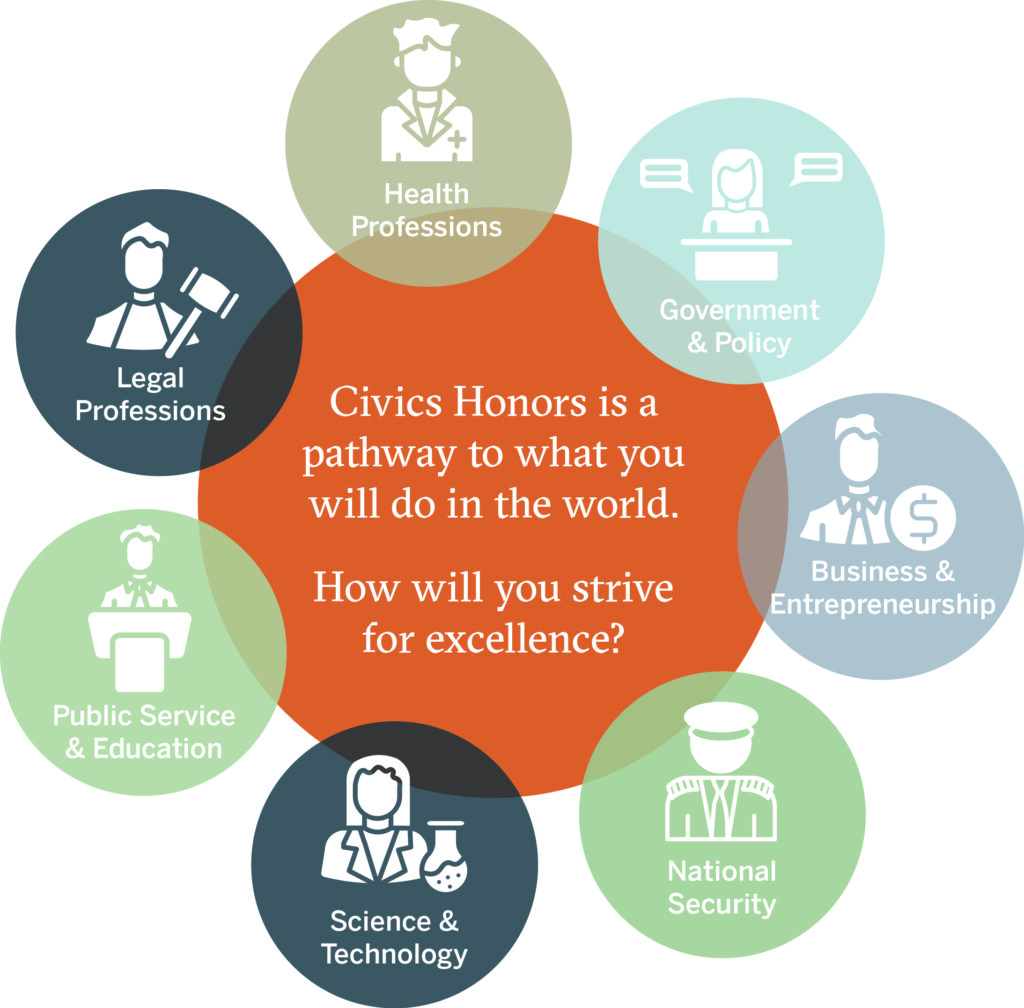The Bachelor of Arts with a major in Civics Honors introduces students to the intellectual inheritance of Western Civilization and to the American constitutional tradition. From the first intellectual foundations through a capstone thesis and internship, students gain experience that informs a life of service.
Students take a sequence of Intellectual Foundations courses:
- CIV 301 Perennial Problems in Civic Thought
- CIV 303J Origins of American Institutions
- CIV 303K Democracy and Capitalism
- CIV 305 Excellence of Character: The Virtues
In dedicated Tools courses, students mature their capacity for understanding, rhetoric, inquiry, and textual analysis through:
- CIV 302 Truth and Persuasion
- CIV 304 Foundations of Research Methods for Civics
- CIV 312P Constitutional Principles: Core Texts
- ECO 304K Introduction to Microeconomics
In addition, students take at least two courses in each of the three major areas of coursework: Constitutionalism, Western Civilization, and Civic Leadership.
Constitutionalism courses introduce students to the history of rights, freedoms, and the rule of law. Central questions include: What are rights? Who bears them? What is law? What makes government legitimate? What do I owe to others? How have thinkers in the American tradition answered these questions? What’s the point of America’s complex set of governing institutions?
Course options include:
- CIV 320 Constitutionalism: Ancient and Modern
- CIV 321J Economics and Constitutionalism
- CIV 360 Advanced Topics in Constitutional History and Principles
- CIV 363 Advanced Topics in Rights, Freedoms, and the Rule of Law
- CIV 372 Independent Research in Constitutionalism
Western Civilization courses introduce students to the quest for wisdom about how to live well and how to achieve liberty and order in community. Important questions include: What does it mean to be human? What does it mean to be an individual or a member of a community? What’s a good life? What, if anything, is sacred? What is friendship? What deserves my love?
Course options include:
- CIV 322J The Quest for Community
- CIV 322K Politics and the Transcendent
- CIV 361 Advanced Topics in Western Civilization
- CIV 364 Advanced Topics in Civic Thought and Culture
- CIV 373 Independent Study in Western Civilization
Civic Leadership courses give students practice resolving questions through ethical reflection, economic analysis, and thoughtful statecraft. Important questions include: How should I live and lead? How do I resolve ethical questions? What factors produce economic dynamism, and how are they measured? Which economic and political system best promotes human flourishing? How do nations relate to one another? What are the possible courses of action when those relationships break down?
Course options include:
- CIV 323J Ethical Analysis for Civic Leaders
- CIV 325K Economic Analysis for Civic Leaders
- CIV 362 Advanced Topics in Ethics and Leadership
- CIV 365 Advanced Topics in Strategy and Statecraft
- CIV 374 Independent Research in Civic Leadership
All students complete a thesis, an internship, foreign language sequence, and electives. The thesis spans two semesters and it is the capstone of the Civics Honors experience.


